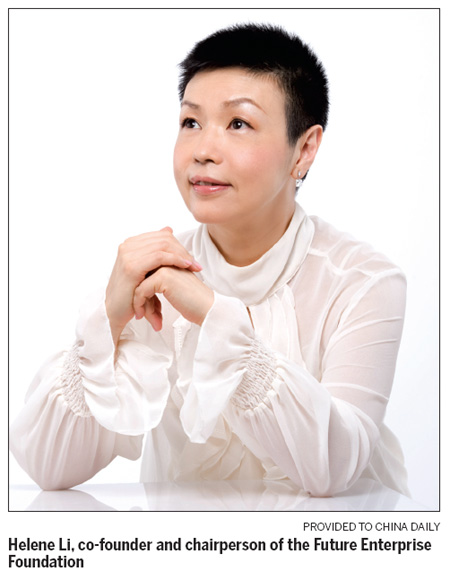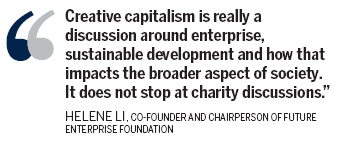Asia ready for 'Creative Capitalism'
Updated: 2010-05-05 07:59
By George Ng(HK Edition)
|
|||||||||

Goal is to end 'world inequities' through 'sustainable development'
"Actually, it has been an extremely timely issue for Asia, and particularly for Hong Kong," said Helene Li, co-founder and chairperson of the Future Enterprise Foundation, explaining the rationale behind a campaign being pioneered by her organization and partners to proactively promote "creative capitalism" in the region.
Creative Capitalism, an ideology initiated and popularized by Microsoft founder Bill Gates at the January 2008 World Economic Forum in Davos, Switzerland, calls for a new form of capitalism that works not only to generate profits but also to address and solve problems stemming from what Bill Gates has called "the awful inequities in the world - appalling disparities in health, wealth and opportunity that condemn millions of people to lives of dispair", using market forces to better address the needs of the poor.
The 2008 global financial crisis and the subsequent global recession has further enlightened many intellectuals and socially-responsible entrepreneurs and convinced them that traditional capitalism, which they believe is always associated with greed and corruption, has failed to benefit all members of society and foster a sustainable economy, highlighting the need for the world to promote this new form of capitalism.
While the Western world has already taken the first steps in promoting Creative Capitalism, Asia is now poised to carry forward the idea, Li told China Daily in an exclusive interview.
The new development and setting in the global economy has empowered - as well as obligated - Asia to do so, she suggested.

"In this recovery from the global financial crisis, there is an obvious shift of economic center of gravity from the West to the East, and Asia is very much the growth engine for the global economy. Within Asia, China is definitely one of the key drivers, fueling this growth engine," she explained.
The shift of economic center of gravity to Asia has allowed the region broader participation in the international arena, and bestowed on the region stronger power in reshaping the global economy into a more sustainable one.
On the other hand, she observed, new challenges spawned by the 2008 global financial crisis and the subsequent global economic downturn have forced Asia to look for an innovative way - that should transcend ideology - to develop the economy that will benefit not only the rich, but also the poor.
"We have to rise to the challenges of different market dynamics following the financial crisis, different competitive landscapes that have been fundamentally reshaped. As we are coming out of the crisis, by no means can we have a very clear line of sight into what the future can imply for all of us," Li said.
"That is why we think Creative Capitalism is strategically relevant for Asia, for Hong Kong,"
"With all that substance, I think there is a new way to look at how enterprises, governments, foundations, and other stakeholders can best work together to drive more sustainable economic growth that has a better impact on all walks of society," she said, adding "it is a very timely issue."
Initial steps have been made in Europe and North America to look at how sustainable development can be achieved, while entrepreneurs in the region, particularly those in Hong Kong, have long been doing their part, in the form of philanthropy, to help the poor or those who are in need of help.
However, she said, obviously, both Asia and the Western world haven't done enough in developing a sustainable economic growth model.
"Creative capitalism is really a discussion around enterprise, sustainable development and how that impacts the broader aspect of society. It does not stop at charity discussions," she said, adding, "It is such a huge and deep topic."
Actually, no single stakeholder group in society can solve the entire issue of unsustainable growth and social inequity, Li suggested.
"That's precisely the reason why we put together this forum, and why we have managed to get such strong support for the forum," she said, referring to the Creative Capitalism Forum to be jointly organized by her organization and the Hong Kong Polytechnic University in the city on May 10.
The Creative Capitalism Forum, which will be made an annual event, will serve as an integrated platform to advocate and deepen the discussion of themes pertaining to sustainable development of enterprises and trends of socially-responsible economy across key stakeholder groups, the organizers have emphasized in their pre-forum campaign.
It will specifically focus on themes surrounding sustainable development in the Asian context as a basis for ongoing research and sustenance of Asia's economic growth while seeking to foster a closer dialogue between Asian and Western economies to achieve shared goals amid a re-shaping of global economic forces.
Hong Kong being rightfully a major financial center with a high concentration of enterprises, foundations and multinational companies, it is a natural location to choose the first forum, said Li, explaining the city's role in this campaign.
The Future Enterprise Foundation has spelled out its mission as being "Doing good and doing it well", with an ultimate goal of creating a "virtuous cycle" of sustainable venture philanthropy through deepening the awareness in the mainstream economy of the importance of a socially responsible agenda.
China Daily
(HK Edition 05/05/2010 page2)